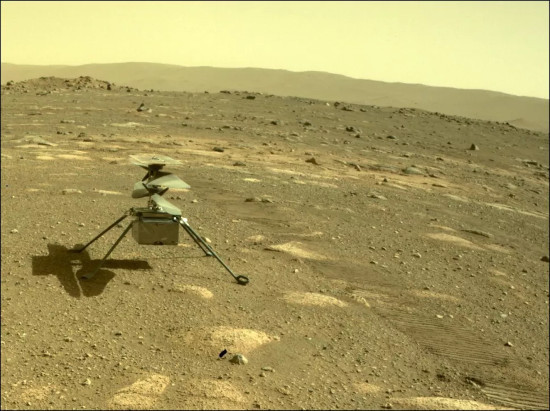Photo: The Insanely successful White Helicopter on Mars: The Little White Chopper that just keeps on going!!!
(005875.811-:E-000062.43:N-AC:R-SU:C-30:V)
[That little helicopter on Mars was designed and built almost exclusively by a team of Whites led by an Asian as a token manager of it. But if you look at the control room, you'll see it's not just Whites, it is ALL WHITE MEN. So yeah, let White men feel some White male pride. There's nothing wrong with that. Anyway, the well designed little White-man's helicopter is performing insanely well. They initially hoped they could maybe get 5 flights. But, they're at 21 flights and the little chopper, the first flying aircraft on another planet will be flying right through the Martian summer before the Martian winter destroys it! So yeah, White Technology is SMOKING … on another planet. Jan]
The planned five-flight mission is now at 21 flights and counting.
Ingenuity’s flying days have been extended once again.
The miniature Mars chopper now has clearance to continue flying until at least September, NASA’s Jet Propulsion Laboratory (JPL) announced today (March 15). As part of this extension, Ingenuity will also sport some special upgrades that will allow the 4-pound (1.8 kilograms) drone to do even more daring flights in support of the Perseverance rover mission that landed with it in February 2021.
"I remember thinking when this all started, we’d be lucky to have three [flight] entries and immensely fortunate to get five. Now, at the rate we’re going, I’m going to need a second [log]book," Håvard Grip, Ingenuity chief pilot, said in a JPL statement.
When Ingenuity made its first tentative hop on April 19, 2021, it was hailed not only as the first interplanetary flight but as concrete proof that it was possible to fly an aircraft in the thin Martian atmosphere. (Wind tunnel tests and modeling suggested it was possible, but the real-life Martian flight sealed the deal.)
That first experimental flight lasted just 39.1 seconds, and in the months since, Ingenuity has proven itself far beyond the initial plan that saw the craft making five flights. Now with 21 flights completed as of last week, Ingenuity has flown for a total of 38 minutes and traveled 2.9 miles (4.6 kilometers).
Ingenuity’s new extended mission will task the craft with assisting Perseverance in exploring the remains of the river delta inside the Red Planet’s Jezero Crater, where the rover landed and where scientists hope to spot signs of ancient microscopic life. But to get there, Ingenuity will need to complete a complex flight plan that will include new software upgrades.
The Ingenuity team has continued to adapt to support the continued mission of the helicopter, noted Teddy Tzanetos, Ingenuity team lead at JPL, in the same statement. Team members "are making upgrades to our flight software geared toward improving operational flexibility and flight safety," Tzanetos said.
For example, a fresh software update now releases Ingenuity from its previous flight ceiling of 50 feet (15 meters), which "could result in incremental increases in both air speed and range" on future flights, the statement read. Other upgrades will allow Ingenuity to adjust its wind speed, or its position relative to terrain texture beneath.
"Future software upgrades may include adding terrain elevation maps into the navigation filter, and a landing-hazard-avoidance capability," JPL noted. These dynamic flight features may be necessary to continue Ingenuity’s track record of success, given that the Jezero delta features cliffs, boulders, sand traps and other obstacles.
Ingenuity’s 22nd flight, expected to take place no earlier than March 19, will see the craft fly roughly a quarter of a mile (1,150 feet or 350 meters), including a sharp mid-air turn to maneuver around a large hill. At least two or three more flights will be needed afterward to reach the delta, JPL stated.
After Ingenuity touches down in the delta, it will help engineers choose which dry river channel (among two) in which to direct Perseverance operations, and potentially to find science targets as well.
If that goes well, JPL stated, the chopper may be tasked with observing geologic features that Perseverance can’t reach on the ground. It also might work to seek out landing zones and caching areas for a planned future sample-return mission to pick up.
One of Perseverance’s main mission goals is to collect samples of Martian material for future study back on Earth. The rover currently has eight samples in its caching system ready for future deposit; the hope is that a joint NASA-European Space Agency mission will return the caches to Earth as soon as 2031.
Get a Free PDF Book: The Boer Fight for Freedom (1902)
Here is a really old, historical book written shortly after the 2nd Anglo Boer War. It is 634 pages long and includes photos, illustrations and maps. This book was written by an Irishman who was a member of the British House of Commons. He was so OUTRAGED by this war started by the British that he resigned from his position in 1899.
Best Independent Website that monitors Ukrainian Tank losses in Ukraine War
Oryx is a brilliant independent Dutch website that monitors lots of military losses including the losses of Russian and Ukrainian tanks. They ONLY count vehicles that they can get photos of and can prove that these are the correct vehicles that were destroyed. This link will take you to see the verified Ukrainian tank losses and you can click to see the photos.
Video: The US Government Revoked my VISA and stopped me getting on the plane to the USA
On 30th April, 2024, I was due to get on a plane to the USA. This is a short video about my bizarre experience that day.


